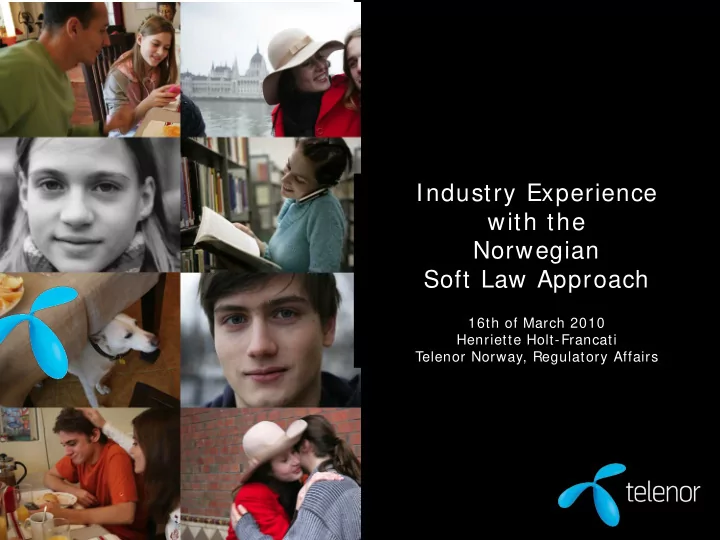

Industry Experience with the Norwegian Soft Law Approach 16th of March 2010 Henriette Holt-Francati Telenor Norway, Regulatory Affairs 1 00 Month 0000
Regulation of the Internet – from ’not’ to ’hot’? Supporters of net neutrality call for hard law safeguarding the socalled “Internet freedoms”: • Preserve the Internet as open and non-discriminatory platform for communication, innovation and distribution of content, services and applications • Radical proponents of network neutrality would prefer to see smart high capacity networks as simple ’bit pipes’ 2 00 Month 0000
Regulation of the Internet – from ’not’ to ’hot’? Internet access providers need flexibility to run own networks and use spectrum resources effectively: • Unlike a switched telephony network, the Internet is a shared resource, that means… – Capacity is finite – Risk of traffic congestion • Increasing costs: Huge traffic growth requires still more network investments • Flattening revenues: Broadband / data prices are under pressure • Network management tools are necessary to reduce investment costs and run networks effectively 3 00 Month 0000
A fundamental difference between the US and European approach to Net Neutrality: Choice! • Norwegian – like European - consumers can vote with their feet! • They do not like ISPs to engage in anti- competitive or discriminatory behavior like (blocking, filtering, censorship etc.) • … but they do appreciate: – quality services delivered over robust networks with as little congestion as possible – a wide choice of products and prices – secure services free of spam, virus, malware etc. 4 00 Month 0000
Telenor’s experience with the Norwegian Guidelines • The net neutrality guidelines express on paper what was - and still is - common Internet ’etiquette’ in Norway • As a customer driven company, Telenor would have behaved just the same, even without the NPT guidelines 5 00 Month 0000
Telenor’s experience with the Norwegian Guidelines • However, the guidelines have been a positive contribution in other respects: – Prom otes dialogue rather than conflict : Common ground and vocabulary for discussing net neutrality issues – The consum er is in focus, and the m ain stakeholders m ust behave accordingly : Consumers have rights (starting point was ’ISP have obligations’ – which is a totally different approach!) – A balanced and practical approach to net neutrality : Firm main rules, but pragmatic and sensible exemptions – Flexibility, rather than predictability, is needed : Internet business models are far from stable yet 6 00 Month 0000
How to handle the explosive growth in data traffic? • Robust and smart networks through capacity upgrades – and network management • Differentiation through different types of data pricing – Pay-as-you-go – Flat rate data packages for different needs – Two sided pricing models • Traffic priotisation – Services delivered according to their quality requirement • Caching and Content Distribution Networks – Effective content distribution • QoS content delivery 7 00 Month 0000
End-to-end service quality depends on more than the access providers • Providers of content, services and applications Own network face several Internet distribution Telenor Content alternatives: Distribution – Own server Own server (co- (co-location) location) – Other ISP – Telenor Content Distribution – Content aggregators, like Akamai Akamai or similar – Aggressive Internet Other ISP protocols ”grabbing” available bandwidth 8 00 Month 0000
Openness and Innovation • Who provides value to the customer? – Smart networks, smart phones or smart applications and services? All! • Openness should apply to all parts of the Internet value chain – How neutral are adaptive protocols? – How neutral is App Store? – How neutral are Googles search engines? • Don’t pick winners through sector specific regulation • General competion law, combined with the New Telecoms Package focusing on consumer transparency, are robust, long- lasting tools to secure openness • The same openess standard should apply to all parts of the Internet value chain 9 00 Month 0000
Telenor’s position on net neutrality • Telenor supports an open and innovative Internet. It is a crucial part of the value proposition for broadband access • The current EU regulatory framework has already the appropriate regulatory remedies to handle net neutrality issues – no need to introduce new regulatory remedies • If introduced, net neutrality measures must not unduly limit network providers’ flexibility to manage networks and traffic efficiently, or distort investment incentives • Telenor’s experience with Norwegian net neutrality guidelines suggests that well balanced ‘soft law’ may work better than ‘hard law’: – aims at consumer protection (minimum rights, transparency) and targets negative discrimination (censorship, blocking, filtering) – we can still do traffic management to prevent congestion and prioritise e.g. real time service such as voice over data, when demand exceeds available capacity 10 00 Month 0000
Recommend
More recommend